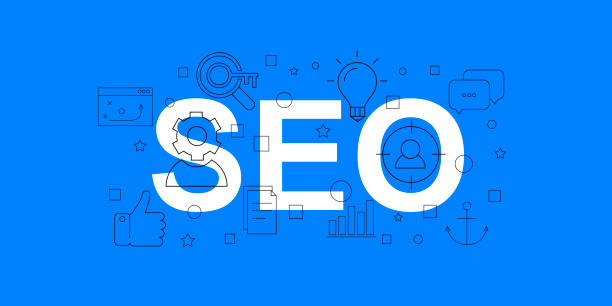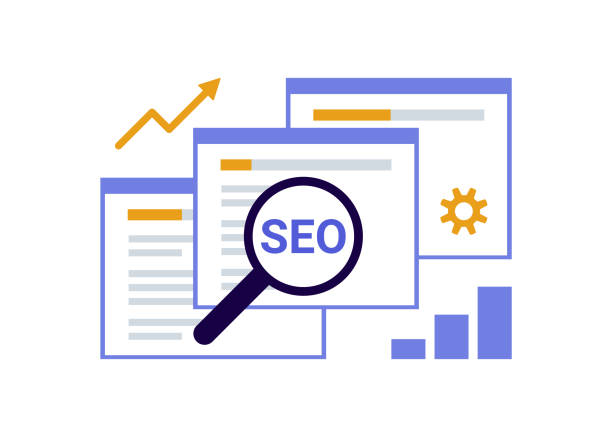What is SEO and Why is it Important?
What is SEO and Why is it Important?
SEO (Search Engine Optimization) is the process of optimizing your website for search engines like Google, Bing, and Yahoo.
The main goal of SEO is to increase the website’s ranking in search results (SERP) and consequently increase incoming traffic through organic (non-paid) search.
Why is SEO important? Imagine you have an online store that offers quality products.
If no one knows the name of your store, how can they become aware of its existence? Search engines play a very important role in this area.
Users typically turn to search engines to find the information, products, and services they need.
If your website ranks high in search results, the likelihood that users will find you and use your services is much higher.
In fact, SEO provides an opportunity to attract potential customers without paying for direct advertising.
Also, websites that are well optimized usually offer a better user experience, which also helps to increase user satisfaction and ultimately increase sales.
For more information about SEO, you can visit Wikipedia.
In today’s world, having an online presence is crucial for businesses.
SEO, as a digital marketing strategy, helps you stand out in this competitive arena and achieve your business goals.
Therefore, investing in SEO is an investment in the future of your business.
Is your online store ready to attract maximum customers and increase sales? Rasaweb transforms your online business with modern and efficient online store design.
✅ Increase speed and improve SEO
✅ Excellent user experience on mobile and desktop⚡ Get a free consultation on online store design from Rasaweb!
Introduction to Basic Technical SEO Concepts
Introduction to Basic Technical SEO Concepts
Technical SEO refers to a set of actions that are performed to improve the crawling and indexing of a website by search engines.
This type of SEO does not directly affect website rankings, but it provides the necessary infrastructure for the success of other SEO strategies.
Some basic Technical SEO concepts include:
- XML Sitemap: A file that contains a list of all important pages on your website.
Submitting a sitemap to search engines helps them easily find and index your pages. - Robots.txt File: A file that tells search engines which pages of your website should not be crawled.
This file is used to prevent crawling of unnecessary or duplicate pages. - Page Speed: Page loading speed is an important factor in user experience.
Search engines also value page loading speed, and websites with higher speeds achieve better rankings. - Mobile-Friendliness: Today, most users access the Internet via mobile phones.
Therefore, your website should be optimized for mobile devices.
Google also rewards websites that have a good mobile version. - SSL/HTTPS: Using the HTTPS (Secure Hypertext Transfer Protocol) protocol is essential for website security.
HTTPS encrypts information between the website and users and prevents hackers from accessing this information.
Google also gives a better ranking to websites that use HTTPS.
Following these Technical SEO tips helps search engines better understand your website and consequently gain a better ranking in search results.
Keyword Research, the Foundation of SEO
Keyword Research, the Foundation of SEO
Keyword research is one of the most important steps in the SEO process.
Keywords are the terms that users enter into search engines to find the information they need.
By identifying the right keywords, you can optimize your website’s content to rank higher in search results for those keywords.
To perform keyword research, you can use various tools such as Google Keyword Planner, Ahrefs, SEMrush, and Moz Keyword Explorer.
These tools help you identify keywords related to your business, check their search volume, and assess the level of competition for each keyword.
When choosing keywords, consider the following:
- Relevance: Keywords should be relevant to your website’s content and your products or services.
- Search Volume: Keywords should have a suitable search volume.
If a keyword has a very low search volume, even if you rank high in its search results, it will not bring much traffic to your website. - Competition: Keywords should have a suitable level of competition.
If a keyword has very high competition, it will be very difficult to achieve a high ranking in its search results.
Using keyword research, you can optimize your website’s content for the right keywords and attract more organic traffic to your website.
For example, the table below shows some free and non-free keyword research tools.
| Tool | Type | Features |
|---|---|---|
| Google Keyword Planner | Free | Keyword suggestions, search volume, competition level |
| Ubersuggest | Free (limited) / Paid | Keyword suggestions, competitor analysis, content ideas |
| SEMrush | Paid | Comprehensive keyword analysis, rank tracking, competitor analysis |
| Ahrefs | Paid | Link analysis, keyword research, competitor analysis |
Click here to preview your posts with PRO themes ››
On-Page SEO: Content Optimization
On-Page SEO: Content Optimization
On-Page SEO refers to the set of actions that are performed within your website to improve its ranking in search results.
These actions include optimizing content, title tags, meta descriptions, URLs, and the website’s internal structure.
The most important aspect of On-Page SEO is content optimization.
Your content should be:
- Valuable and Relevant: Your content should be valuable and relevant to your target audience and answer their questions and needs.
- Unique: Your content should be unique and not copied from other websites.
- Optimized for Keywords: Your content should be optimized for your target keywords.
This means using keywords in the title, subheadings, body text, and image tags. - Readable and Engaging: Your content should be readable and engaging and written in a way that encourages users to stay on your website.
In addition to content, title tags and meta descriptions also play an important role in On-Page SEO.
Title tags specify the title of your website pages and are displayed in search results.
Meta descriptions provide a summary of the page’s content and can encourage users to click on your website’s link.
You should follow certain tips for On-Page SEO and improving website ranking.
URLs should also be short, descriptive, and include keywords.
The website’s internal structure should also be logical and user-friendly so that users can easily navigate your website and find the information they need.
Are you losing potential customers due to an unprofessional website? Rasaweb is your answer! With our specialized corporate website design services:
✅ Enhance the credibility and position of your business
✅ Experience attracting more targeted customers
⚡ Take action now to receive a free consultation!
Off-Page SEO: Link Building and Authority
Off-Page SEO: Link Building and Authority
Off-Page SEO refers to the set of actions that are performed outside of your website to improve its ranking in search results.
The most important aspect of Off-Page SEO is link building.
Link building means receiving links from other websites to your website.
Links show search engines that your website is credible and valuable and deserves a higher ranking.
In general, the more websites that link to your site, the higher your Domain Rating Domain Rating will be, and the better you will rank.
To get links, you can use various methods, such as:
- Creating Quality Content: If you create quality content, other websites are more likely to link to it.
- Promoting Content: Promote your content on social media and other marketing channels to get more people to see it and link to it.
- Building Relationships: Build relationships with other bloggers and website owners in your industry and ask them to link to your content.
- Participating in Online Activities: Participate in forums, blogs, and social networks related to your industry and respond to questions and comments from others.
In addition to link building, brand reputation also plays an important role in Off-Page SEO.
If your brand is well-known and trusted, users are more likely to click on your website link in search results.
User Experience (UX) and its Impact on SEO
User Experience (UX) and its Impact on SEO
User experience (UX) refers to the feeling and experience that users have when using your website.
If users are satisfied with using your website, they are more likely to return to it and recommend it to others.
Search engines also value user experience.
Google uses various algorithms to evaluate user experience, and websites with better user experience achieve better rankings.
These algorithms measure user experience using parameters such as bounce rate and the amount of time a user spends on the site, etc.
Some of the factors that affect user experience include:
- Page Load Speed: Users expect website pages to load quickly.
If your page loads slowly, users will leave your website. - Website Design: Your website design should be attractive, user-friendly, and consistent with your brand.
- Usability: Your website should be easy to use and users should be able to quickly and easily find the information they need.
- Quality Content: Your website’s content should be valuable, relevant, and optimized for your target keywords.
By improving the user experience of your website, you can improve its ranking in search results and attract more organic traffic to your website.
You should also keep in mind that website SEO is one of the factors that affect the visibility of your website.
Click here to preview your posts with PRO themes ››
Competitor Analysis in SEO and Modeling Successes
Competitor Analysis in SEO and Modeling Successes
Competitor analysis is one of the most important parts of an SEO strategy.
By analyzing competitors, you can identify their strengths and weaknesses, discover new opportunities, and model their successes.
To analyze competitors, you can use various tools such as Ahrefs, SEMrush, and Moz Keyword Explorer.
These tools help you to:
- Identify Competitors’ Keywords: By identifying competitors’ keywords, you can discover new keywords to target in your SEO strategy.
- Check Competitors’ Inbound Links: By checking competitors’ inbound links, you can identify websites that link to them and try to get links from them.
- Analyze Competitors’ Content: By analyzing competitors’ content, you can identify topics and content formats that have been successful for them and model them.
- Check Competitors’ Social Media Performance: By checking competitors’ social media performance, you can identify their social media marketing strategies and model them.
By using competitor analysis, you can improve your SEO strategy and increase your website’s ranking in search results.
The table below lists some of the information that should be reviewed in competitor analysis.
| Aspect Under Review | Key Information | Suggested Tool |
|---|---|---|
| Keywords | Competitors’ main and secondary keywords, search volume, ranking | SEMrush, Ahrefs |
| Links | Inbound links (backlinks), domain quality, anchor text | Ahrefs, Majestic SEO |
| Content | Content types (articles, videos), quality, word count, updates | BuzzSumo, Competitors’ Website |
| User Experience | Load speed, website design, mobile-friendliness | Google PageSpeed Insights, Mobile-Friendly Test |
| Social Media | Number of followers, engagement rate, type of content published | Social media analysis tools (such as Hootsuite) |
Essential SEO Tools for Webmasters
Essential SEO Tools for Webmasters
To do SEO professionally, you need to use various tools.
These tools help you identify keywords, check inbound links, analyze your website’s performance, and monitor competitors.
Some essential SEO tools include:
- Google Analytics: Google Analytics is a free tool that helps you analyze your website’s traffic, review user behavior, and evaluate the performance of your marketing campaigns.
- Google Search Console: Google Search Console is a free tool that helps you check your website’s performance in Google search results, identify indexing errors, and submit your sitemap.
- Ahrefs: Ahrefs is a paid tool that helps you analyze inbound links, keywords, and competitors.
- SEMrush: SEMrush is a paid tool that helps you analyze keywords, competitors, and online advertising.
- Moz Keyword Explorer: Moz Keyword Explorer is a paid tool that helps you identify keywords, check their search volume, and assess the level of competition for each keyword.
By using these tools, you can improve your SEO strategy and increase your website’s ranking in search results.
Remember that SEO is an ongoing process and requires effort and patience.
Are you unhappy with the low conversion rate of visitors to customers on your online store?
Solve this problem forever with professional online store design by Rasaweb!
✅ Increase the conversion rate of visitor to customer
✅ Create an excellent user experience and build customer trust
⚡ Get a free consultation
Measuring and Tracking SEO Results and Continuous Optimization
Measuring and Tracking SEO Results and Continuous Optimization
After implementing an SEO strategy, it is important to measure and track its results.
This will help you understand which actions have been effective and which actions need improvement.
To measure and track SEO results, you can use various tools such as Google Analytics and Google Search Console.
These tools help you to:
- Check Your Website’s Organic Traffic: Organic traffic refers to the traffic that comes to your website through non-paid search results.
- Check Your Website’s Ranking for Target Keywords: By checking your website’s ranking for target keywords, you can understand how successful your SEO strategy has been.
- Check Your Website’s Bounce Rate: Bounce rate refers to the percentage of users who leave your website after viewing one page of your website without viewing other pages.
- Check the Duration of Users’ Presence on Your Website: The duration of users’ presence on your website shows how attractive and valuable your content is to them.
Based on the measured results, you can optimize your SEO strategy and increase your website’s ranking in search results.
SEO is an ongoing process and requires effort and patience.
Never give up trying and always look for new ways to improve your website’s SEO.
By continuously optimizing site SEO, you can gain a better position.
Click here to preview your posts with PRO themes ››
Common SEO Mistakes and How to Avoid Them
Common SEO Mistakes and How to Avoid Them
In the SEO process, mistakes may occur that can harm your website’s ranking.
Being aware of these mistakes and how to avoid them will help you have a more effective SEO strategy.
Some common SEO mistakes include:
- Keyword Stuffing: Excessive use of keywords in content can harm your website’s ranking.
Search engines penalize websites that use this method. - Link Buying: Buying links from other websites is an unethical way to increase website ranking.
Search engines penalize websites that use this method. - Duplicate Content: Publishing duplicate content on the website can harm your website’s ranking.
Search engines penalize websites that use this method. - Ignoring User Experience: If users are not satisfied with using your website, they are less likely to return to it and recommend it to others.
Search engines value user experience, and websites with better user experience achieve better rankings.
By avoiding these mistakes, you can have a more effective SEO strategy and increase your website’s ranking in search results.
Always remember that the ultimate goal of SEO is to provide valuable and relevant content to users.
Frequently Asked Questions
| Question | Answer |
|---|---|
| What is SEO? | SEO, or Search Engine Optimization, is a process to increase the quality and quantity of website traffic by improving site ranking in natural (organic) search engine results, such as Google. |
| What are the main types of SEO? | SEO is divided into three main categories: On-Page SEO, Off-Page SEO, and Technical SEO. |
| What does On-Page SEO include? | On-Page SEO includes optimizing elements within the website, such as keywords, page title (Title Tag), meta descriptions (Meta Description), content, URL structure, images, and internal links. |
| What is Off-Page SEO? | Off-Page SEO refers to activities outside of the website that help improve its ranking, such as Backlink Building, social media marketing, and Brand Mentions. |
| What is Technical SEO? | Technical SEO optimizes the technical aspects of a website to help search engines crawl and index it better. This includes site speed, mobile-friendliness, site structure, sitemaps, and the Robots.txt file. |
| What role do Keywords play in SEO? | Keywords are terms that users enter into search engines. Using relevant keywords correctly and purposefully in the content and site elements helps search engines understand your page’s topic and display it in related searches. |
| What is a Backlink and why is it important? | A backlink, or inbound link, is a link from one website to another. Backlinks act as a “vote of confidence” from other sites for search engines and play an important role in site credibility and ranking, especially if they are from reputable sites. |
| What effect does quality content have on SEO? | Quality, relevant, comprehensive, and unique content not only attracts and retains users but also shows search engines that your page is valuable. This helps to improve ranking, reduce bounce rate, and increase user time on the site. |
| Why is site loading speed important for SEO? | Site loading speed is an important ranking factor for Google. Faster sites provide a better user experience, have lower bounce rates, and are preferred by search engines. |
| Is SEO a one-time process? | No, SEO is a continuous and long-term process. Search engine algorithms are constantly changing, competition is increasing, and site content also needs updating. Therefore, SEO requires ongoing monitoring, analysis, and optimization. |
And other advertising agency services Rasa Web in the field of advertising
Smart social media: A creative platform to improve customer behavior analysis with custom programming.
Smart UI/UX: Professional optimization for campaign management using real data.
Smart Marketing Automation: An exclusive service for online growth based on custom programming.
Smart Link Building: A creative platform to improve SEO ranking with an attractive user interface design.
Smart Data Analysis: A combination of creativity and technology for online growth by managing Google Ads.
And hundreds of other services in the field of internet advertising, advertising consulting and organizational solutions
Internet Advertising | Advertising Strategy | Advertorial
Resources
Comprehensive SEO Guide – Zoomit
,SEO Guide 2023 – Aryanik
,SEO Training – Nikan Sepehr
,SEO Training for Beginners – Faraznetwork
? With “Rasaweb Afarin”, your business takes flight in the digital world! From fast website design and creative to comprehensive online marketing strategies, we are your digital success partner.
📍 Tehran, Mirdamad Street, next to Central Bank, South Kazerun Alley, Ramin Alley No. 6














